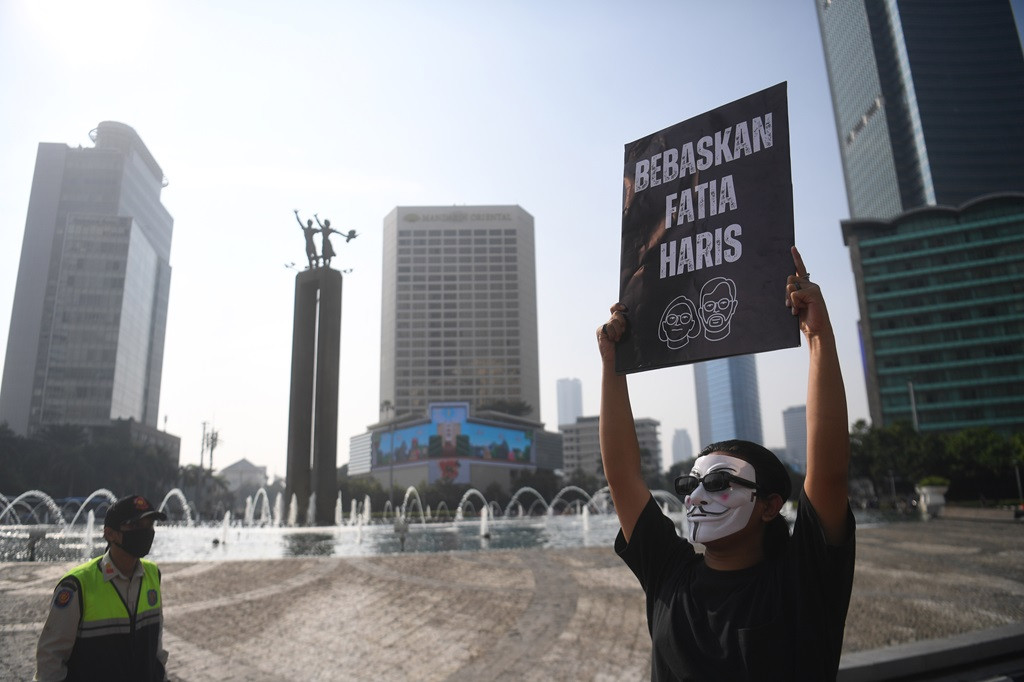Popular Reads
Top Results
Can't find what you're looking for?
View all search resultsPopular Reads
Top Results
Can't find what you're looking for?
View all search resultsLuhut’s rejected lawsuit
The verdict has dispelled fears that the judges might crack under pressure and convict the human rights activists, who were fighting a powerful minister.
Change text size
Gift Premium Articles
to Anyone
 Activists hold a protest in Jakarta on Jan. 7, 2024, urging the court to acquit human rights activists Haris Azhar and Fatia Maulidiyanti, who stood accused of defaming senior cabinet minister Luhut Binsar Pandjaitan. The two human rights activists were acquitted on Monday. (Antara/Akbar Nugroho Gumay)
Activists hold a protest in Jakarta on Jan. 7, 2024, urging the court to acquit human rights activists Haris Azhar and Fatia Maulidiyanti, who stood accused of defaming senior cabinet minister Luhut Binsar Pandjaitan. The two human rights activists were acquitted on Monday. (Antara/Akbar Nugroho Gumay)
A
mid a rampant crack-down on human rights, environmental and democracy activists for their critical views of the government, the acquittal from defamation charges of Haris Azhar and Fatia Maulidiyanti, both former coordinators of the Commission for the Disappeared and Victims of Violence (KontraS), is indeed relieving.
The East Jakarta District Court on Monday declared the two human rights defenders not guilty of defaming Coordinating Maritime Affairs and Investment Minister Luhut Pandjaitan when they talked about the former general’s alleged involvement in extractive mining in Papua on Haris’ YouTube channel.
The panel of judges said the two defendants were exercising their freedom of speech, which is guaranteed by the Constitution.
“What is found in the video is an analysis, commentary, opinion analysis and evaluation on the studies by a coalition of civil society organizations,” the judges said in their verdict, which also cleared Haris and Fatia of spreading misinformation.
The verdict has dispelled fears that the judges might crack under pressure and convict the human rights activists, who were fighting a powerful minister.
Luhut, known as one of the most trusted aides of President Joko “Jokowi” Widodo, reported the human rights activists to the police late in 2021. He insisted that he neither owned any business in Papua nor played any role in the growing military presence in the province as Haris and Fatia had stated in their podcast.
Under the Jokowi administration, there has been an increasing crackdown on rights defenders by weaponizing the draconian Electronic Information and Transactions (ITE) Law, as was the case with Haris and Fatia. Data from Amnesty International Indonesia showed that at least 535 people, including human rights defenders, journalists and academics, have been charged under the ITE law from 2019 to 2023, in a total of 504 cases.
Ahead of next month’s presidential and legislative elections, there have been reports of intimidation allegedly committed by the state apparatus against people who criticized government officials or demonstrated their support for opposition presidential candidates.
State prosecutors had demanded four years of prison for Haris, three and a half years for Fatia and the removal of his YouTube channel. Unsurprisingly they are appealing the exoneration of the rights activists.
In response to the court verdict, Luhut, who has been back at work after two months of medical treatment, expressed his full respect for the court’s ruling, despite some reservations. He, for example, could not accept the two human rights activists calling him “lord”, which the court deemed was not defamatory.
We believe it will be much more productive for the minister to move on and focus on his unfinished business until his term as a cabinet member ends in October.
One lesson public officials can learn from the defamation case is that they need to adapt to the aspirations of the public and accept complaints and criticism as much needed feedback. The use of power to silence critics bodes ill for a nation that prides itself on being the world’s third largest democracy.
The defamation trial of Haris and Fatia had sparked protests from civil society groups, who accused the government of attempting to silence critics. They praised the court’s verdict and hoped it would set a legal precedent for future defamation cases.
Following public pressure, the ITE law was amended in December to water down some draconian provisions, such as those regulating online defamation, in line with the new Criminal Code. But as long as defamation provisions are there, the possibility of the authorities enforcing the law to curb freedom of speech remains.
The acquittal of Haris and Fatia is not the end of the story, especially if the prosecutors challenge the verdict. Only through the removal of the defamation clauses from the justice system can we reach a happy ending.










